医学英语常用对话
医务人员对话中英文
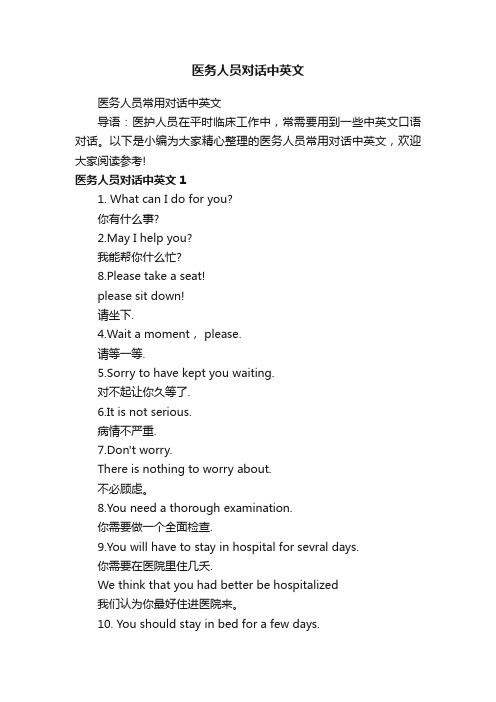
医务人员对话中英文医务人员常用对话中英文导语:医护人员在平时临床工作中,常需要用到一些中英文口语对话。
以下是小编为大家精心整理的医务人员常用对话中英文,欢迎大家阅读参考!医务人员对话中英文11. What can I do for you?你有什么事?2.May I help you?我能帮你什么忙?8.Please take a seat!please sit down!请坐下.4.Wait a moment, please.请等一等.5.Sorry to have kept you waiting.对不起让你久等了.6.It is not serious.病情不严重.7.Don't worry.There is nothing to worry about.不必顾虑。
8.You need a thorough examination.你需要做一个全面检查.9.You will have to stay in hospital for sevral days.你需要在医院里住几夭.We think that you had better be hospitalized我们认为你最好住进医院来。
10. You should stay in bed for a few days.你需要卧床几天.11. You can keep on working.You can carry on with your work.可以继续工作。
12. You should be very careful for a week or two这一两周内,你需要很注意。
13. Try to relax and keep calm.尽量放松保持镇静。
14. You'll soon be all right.你很快就会好起来的.15. 1'm sure this medicine will help you a great deal.这药对你肯定会很有效的.16. Feeling well again is a rather slow process,I'm afraid.恐怕痊愈将是一个很慢的过程.17. You will have to wait for twenty minutes.你需要等20分钟.plete recovery will take a rather long time.彻底恢复需要一段很长的时间。
医学英语会话医生篇

医学英语会话医生篇一、Asking about Symptoms(询问症状)1. Word: Ache- English Explanation: A continuous dull pain.- Phrase: Headache, toothache.- Usage: “I often get an ache in my lower back after sitting for a long time.”- Bilingual Example: “Do yo u have any aches? For example, a headache or a stomachache? I need to know what's wrong with you.”2. Word: Nausea- English Explanation: A feeling of sickness with an inclination to vomit.- Phrase: Nausea and vomiting.- Usage: “Sheplained of nausea this morning.”- Bilingual Example: “You look a bit pale. Are you feeling nausea? It could be a sign of many things.”3. Word: Fatigue- English Explanation: Extreme tiredness resulting from mental or physical exertion or illness.- Phrase: Chronic fatigue.- Usage: “Fatigue is amon symptom among patients with certain diseases.”- Bilingual Example: “You seem so tired all the time. Is it just normal fatigue or something more serious? I'm worried about you.”4. Word: Dizziness- English Explanation: A feeling of faintness, unsteadiness, and wooziness.- Phrase: Sudden dizziness.- Usage: “He experienced dizziness when he stood up too quickly.”- Bilingual Example: “Hey, you said you felt funny. Was it dizziness? That can be really concerning.”5. Word: Rash- English Explanation: An area of reddened, inflamed skin.- Phrase: Skin rash.- Usage: “A rash on the body can be caused by various factors.”- Bilingual Example: “I noticed you have a rash o n your arm. What do you think might have caused it? It's important we figure this out.”二、Diagnosing(诊断)6. Word: Diagnosis- English Explanation: The identification of the nature of an illness or other problem by examination of the symptoms.- Phrase: Accurate diagnosis.- Usage: “The doctor's diagnosis was based on a series of tests.”- Bilingual Example: “I've done all these tests, and my diagnosis is that you might have a mild infection. It's not too bad, but we need to treat it.”7. Word: Symptom- English Explanation: A physical or mental feature which is regarded as indicating a condition of disease.- Phrase: Key symptoms.- Usage: “We need to look at all your symptoms to make a proper diagnosis.”- Bilingual Example: “These symptoms you have are like pieces of a puzzle. We have to put them together to figure out what's wrong. Do you understand?”8. Word: Disorder- English Explanation: An illness that disrupts normal physical or mental functions.- Phrase: Mental disorder.- Usage: “There are many different types of disorders that can affec t a person.”- Bilingual Example: “I'm afraid you might be showing signs of a certain disorder. But don't worry, there are treatments available.”9. Word: Illness- English Explanation: A disease or period of sickness affecting the body or mind.- Phrase: Chronic illness.- Usage: “Living with a chronic illness can be very challenging.”- Bilingual Example: “Your symptoms suggest an illness. But we need more information. How long have you been feeling like this? It's crucial for me to k now.”10. Word: Disease- English Explanation: A disorder of structure or function in a human, animal, or plant, especially one that produces specific signsor symptoms or that affects a specific location and is not simply a direct result of physical injury.- Phrase: Infectious disease.- Usage: “Preventing infectious diseases is very important in public health.”- Bilingual Example: “I suspect you mig ht have a disease.Don't be scared. We'll do more tests to confirm it. Have you been arou nd anyone who was sick lately?”三、Treatment(治疗)11. Word: Treatment- English Explanation: The use of medical methods to try to cure an illness or injury.- Phrase: Medical treatment.- Usage: “The patient is receiving treatment for his heart condition.”- Bilingual Exam ple: “I think the best treatment for you right now is some rest and taking these medications. You'll be okay, trust me.”12. Word: Therapy- English Explanation: Treatment intended to relieve or heal a disorder.- Phrase: Physical therapy.- U sage: “After the accident, he needed physical therapy to regain his mobility.”- Bilingual Example: “We might need to consider therapy for your problem. It could be like a magic wand to make you feel better.”13. Word: Medication- English Explanation: A drug or other form of medicine that is used to treat or prevent illness.- Phrase: Prescription medication.- Usage: “Always follow the doctor's instructions when taking prescription medications.”- Bilingual Example: “I'm going to pres cribe some medication for you. Take it as directed. It's like little soldiers fighting the bad stuff in your body.”14. Word: Cure- English Explanation: A substance or treatment that can end a disease or medical condition.- Phrase: Potential cure.- Usage: “Scientists are constantly searching for a cure for cancer.”- Bilingual Example: “We hope this treatment will be a cure for your ailment. Wouldn't that be great? Just imagine being healthy again.”15. Word: Procedure- English Explanation: A medical operation or treatment.- Phrase: Surgical procedure.- Usage: “The surgical procedure was veryplex but successful.”- Bilingual Example: “We might have to consider a procedure to fix your problem. Are you okay with that? It's a big step, but it could solve everything.”四、Patient Care(病人护理)16. Word: Care- English Explanation: The provision of what is necessary for the health, welfare, maintenance, and protection of someone or something.- Phrase: Patient care.- Usage: “Good patient care is the key to a speedy recovery.”- Bilingual Example: “I want you to know that you'll get the best care here. We'll take care of you like you're family. How does that make you feel?”17. Word: Recovery- English Explanation: The process of bing well again after an illness or injury.- Phrase: Speedy recovery.- Usage: “The doctor wished the patient a speedy recovery.”- Bilingual Example: “Your recovery is our top priority. Do what I say, and you'll be on the road to recovery in no time. Don't you want that?”18. Word: Well - being- English Explanation: The state of beingfortable, healthy, or happy.- Phrase: Mental well - being.- Usage: “We should also focus on the patient's mental well - being during the treatment.”- Bilingual Example: “Your well - being matters to me. I'm not just here to fix your physical problems. How's your mental state? Are you feeling positive?”19. Word: Support- English Explanation: The act of giving assistance, especially financial or practical help.- Phrase: Emotional support.- Usage: “Patients often need emotional support during their illness.”- Bi lingual Example: “I'll give you all the support you need. Emotional support is just as important as medical treatment. You're not alone in this.”20. Word: Health- English Explanation: The state of being free from illness or injury.- Phrase: Public health.- Usage: “Public health initiatives are crucial for the well - being of themunity.”- Bilingual Example: “Your health is in your hands too. I can help, but you need to take care of yourself. Do you understand how important your health i s?”。
常用的医疗会话英语
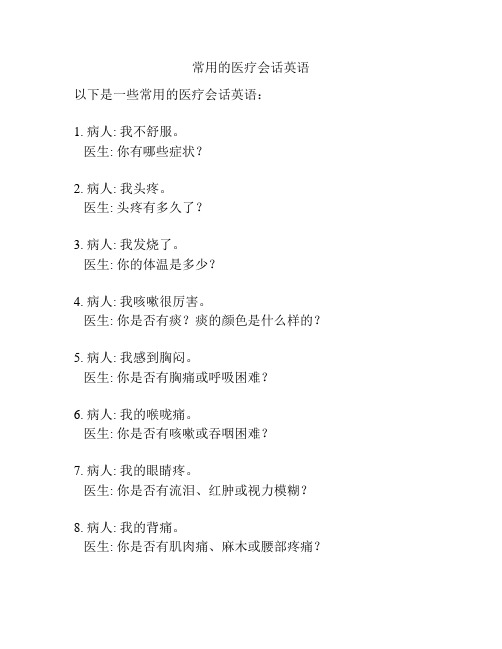
常用的医疗会话英语
以下是一些常用的医疗会话英语:
1. 病人: 我不舒服。
医生: 你有哪些症状?
2. 病人: 我头疼。
医生: 头疼有多久了?
3. 病人: 我发烧了。
医生: 你的体温是多少?
4. 病人: 我咳嗽很厉害。
医生: 你是否有痰?痰的颜色是什么样的?
5. 病人: 我感到胸闷。
医生: 你是否有胸痛或呼吸困难?
6. 病人: 我的喉咙痛。
医生: 你是否有咳嗽或吞咽困难?
7. 病人: 我的眼睛疼。
医生: 你是否有流泪、红肿或视力模糊?
8. 病人: 我的背痛。
医生: 你是否有肌肉痛、麻木或腰部疼痛?
9. 病人: 我感到疲劳。
医生: 你是否有食欲减退或体重下降?
10. 医生: 我会给你开一些药物来缓解症状。
病人: 谢谢,我会按时服用。
11. 医生: 我建议你多休息和喝水。
病人: 好的,我会注意的。
12. 病人: 我需要做进一步的检查吗?
医生: 是的,我建议你做一些血液检查或X光片。
请注意,这些只是一些常见的会话范例。
在医疗情况下,建议您向医生提供更详细的病情描述,以便获得最准确的诊断和治疗建议。
常用医学英语口语对话
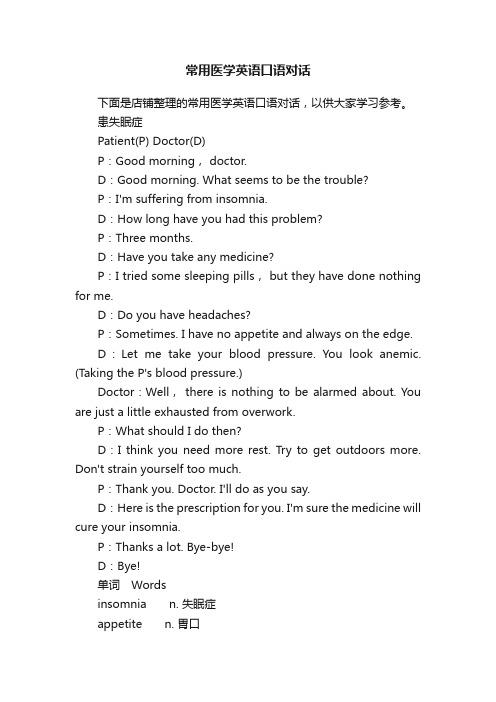
常用医学英语口语对话下面是店铺整理的常用医学英语口语对话,以供大家学习参考。
患失眠症Patient(P) Doctor(D)P:Good morning, doctor.D:Good morning. What seems to be the trouble?P:I'm suffering from insomnia.D:How long have you had this problem?P:Three months.D:Have you take any medicine?P:I tried some sleeping pills, but they have done nothing for me.D:Do you have headaches?P:Sometimes. I have no appetite and always on the edge.D:Let me take your blood pressure. You look anemic. (Taking the P's blood pressure.)Doctor:Well,there is nothing to be alarmed about. You are just a little exhausted from overwork.P:What should I do then?D:I think you need more rest. Try to get outdoors more. Don't strain yourself too much.P:Thank you. Doctor. I'll do as you say.D:Here is the prescription for you. I'm sure the medicine will cure your insomnia.P:Thanks a lot. Bye-bye!D:Bye!单词Wordsinsomnia n. 失眠症appetite n. 胃口pressure n. 压力,血压anemic n. 贫血病exhausted adj 疲倦,筋疲力尽overwork n. 过度劳累outdoors adv 户外cure n. vt 治愈,治好短语Phrasessuffer from 遭受sleeping pills 安眠药on the edge 紧张不安take sb's blood pressure 量血压句子Sentence PatternsWhat seems to be the trouble?哪里不舒服?How long have you had this problem?这种情况有多久了?I tried some sleeping pills, but they have done nothing for me.我试过安眠药,但是对我一点儿都不起作用。
英语医生与病人对话范文通用6篇
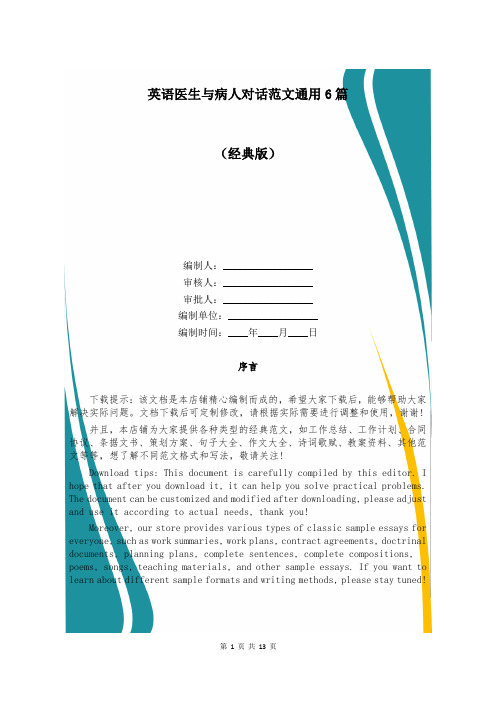
英语医生与病人对话范文通用6篇(经典版)编制人:__________________审核人:__________________审批人:__________________编制单位:__________________编制时间:____年____月____日序言下载提示:该文档是本店铺精心编制而成的,希望大家下载后,能够帮助大家解决实际问题。
文档下载后可定制修改,请根据实际需要进行调整和使用,谢谢!并且,本店铺为大家提供各种类型的经典范文,如工作总结、工作计划、合同协议、条据文书、策划方案、句子大全、作文大全、诗词歌赋、教案资料、其他范文等等,想了解不同范文格式和写法,敬请关注!Download tips: This document is carefully compiled by this editor. I hope that after you download it, it can help you solve practical problems. The document can be customized and modified after downloading, please adjust and use it according to actual needs, thank you!Moreover, our store provides various types of classic sample essays for everyone, such as work summaries, work plans, contract agreements, doctrinal documents, planning plans, complete sentences, complete compositions, poems, songs, teaching materials, and other sample essays. If you want to learn about different sample formats and writing methods, please stay tuned!英语医生与病人对话范文通用6篇英语医生与病人对话范文第一篇Doctor:Good morning.Whats troubling you? You don’t look so good.医生:早上好。
实用医学英语对话大全

实用医学英语对话大全Nurse: Take the elevator to the third floor and turn left. Walk along the corridor and you'll see a sign on your right.病人:好的,谢谢你。
Patient: Okay, thank you.Words:- n: the process of signing up for something- gender: the state of being male or female- address: the n where ___- department: a specific area of a larger n- register: to officially sign up for something- ___: the amount of money charged for a service- lift: an ___Phrases:- run a high fever: have a high body temperature- ___ fact: in fact- in that case: if that is the n- fill in: ___ necessary n- and things like that: and other similar things- register with: sign up for a specific ___ service- had better: should do something- take a lift: ___- make a left turn: turn to the leftSentence Patterns:- What seems to be the problem? What is bothering you?- How long have you had the problem? How long have you been experiencing this issue?- In that case, you have to fill in this n card with your age, gender, address, and other necessary n.- Which department should I register with, madam? Which department should I sign up for?- You'd better go to the medical department. It would be best for you to go to the medical department.Related Words:- blood vessel: a ___When asking a patient about their illness, ___ such as "What seems to be the trouble?" or "Where does it hurt?" to gather n. Other ns may include asking when ___ or which specific body part is ___.Doctor: Please come in. What seems to be the trouble?Doctor: Please have a seat. Let me take a look. There's nothing major. You just ate too much greasy food, ___ for you. After taking these medicines, you'll feel much better. For the next few days, try to have a light diet.Words:seafood - seafoodroast duck - roasted duckvomit - vomitbathroom - restroomlaboratory - labn - noily - greasyPhrases:a great variety of things - a wide range of thingsmade several trips to the bathroom - went to the restroom several timesget your stools tested - have a stool testwrite out a slip - write a lab referraltake your seat - have a seatdue to - because ofSentence Patterns:Have you vomited?I vomited three times and went to the restroom several times last night.You need to have a stool test.I'll write a lab referral for you. Take it to the lab and bring the report back to me when it's ready.There are no major ___.Related Words:- Bellyache- Enteritis- Gastralgia- Gastritis- Appendicitis- Enterogastritis- ___- Nephritis- Diabetes- ___- Urethritis- Cystitis- Diarrhoea- Dysentery- PilesRelated Phrases:- Have a pain in the chest- Have a pain in the abdomen - Have a pain in the back- Have a pain in the ear- Have a pain in the loins- Have a running nose- Have a stuffed-up nose- Have a bad cough- ___ coughing- ___- Have ___- ___- Run with tearsRelated ns:- I have a headache (stomachache, toothache, earache)- I have a sore back (sore throat, sore leg, sore eye)- I have ___.I am experiencing diarrhea.I am ___.Recently, I have been ___.I have been having ___.I have been ___.I have ___.I ___.My right eardrum is infected.My weight has dropped from 80 pounds to 60 pounds due to an n.Patient: I have been ___ for two days and also have lower abdominal pain.Nurse: How heavy is the bleeding? When was your last d?Patient: I have missed my last two ds. The last one was on April 4th.Nurse: ___?Patient: It is regular now, but it used to be late before I got married.Nurse: ___?Patient: I will try.Nurse: ___ test is positive. Where is the pain and how would you describe it?Related Words:Related Phrases:Related ns:Related Words:Related Phrases:Related ns:Do you ___? How long does your d last? I ___ every month. Over the past few weeks, I've been ___, ___.___ issues.___ his dental problems, ___ fortable after meals, experiences bouts of abdominal pain, and ___ area. He also has nausea and vomiting, difficulty swallowing, and has passed more gas than usual. The pain is mainly in the lower upper right part of his abdomen.___ for several days and is now ___, he has noticed a change in the color, texture, and odor of his stool. He also reportssymptoms of high blood pressure, such as frequent ___, increased thirst, ___, ___, excessive sweating, and unexplained tiredness. He has also been experiencing joint pain, including in his hip, knee, and ankle, as well as ___, blurred n in his right eye, and a film over his eyes.___ him and found that he had some earwax buildup, which was causing the fort.___ he use some over-the-counter ear drops to soften the wax and then come back in a week for a follow-up appointment.___At his follow-up appointment, the doctor was able to remove the remaining earwax and his earaches and buzzing noises disappeared.。
医学英语补全对话常用句型

医学英语补全对话常用句型
介绍
本文档旨在提供一些常用的医学英语补全对话句型,以帮助读者更好地掌握医学领域的英语表达。
1. 症状询问句型
1. 您有什么症状?
2. 最近您感到头痛吗?
3. 您感到乏力吗?
4. 您有发烧吗?
5. 您有呕吐或恶心的感觉吗?
2. 询问病史句型
1. 您有什么过敏史吗?
2. 您近期有没有接受过任何手术?
3. 您有家族病史吗?
4. 您近期有没有生病?
5. 您平时有没有服用任何药物?
3. 询问疾病诊断句型
1. 您的症状可能是什么引起的?
2. 您是否进行了相关的检查?
3. 您是否被其他医生诊断过?
4. 您是否有其他疾病并发的可能?
5. 您是否需要进一步的检查以确定诊断?
4. 给予建议句型
1. 您需要多休息。
2. 您应该避免剧烈运动。
3. 您需要合理饮食。
4. 您应该按时服药。
5. 您需要保持情绪稳定。
5. 打开对话句型
1. 请问您是怎么了?
2. 您来就诊的原因是什么?
3. 您需要咨询什么问题?
4. 您对自己的身体状况有什么疑问吗?
5. 您想探讨什么方面的问题?
6. 结束对话句型
1. 感谢您的咨询。
2. 祝您早日康复。
3. 如有其他问题,请随时联系我们。
4. 保持良好的生活惯。
5. 如果情况没有好转,请及时复诊。
总结
以上是一些常用的医学英语补全对话句型,可以辅助您在医学领域的交流中更加流畅地表达。
希望本文对您有所帮助!。
医疗英语口语 日常英语口语100句
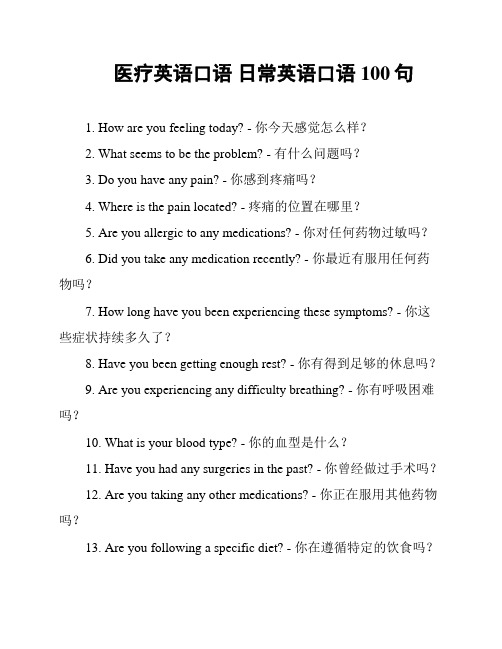
医疗英语口语日常英语口语100句1. How are you feeling today? - 你今天感觉怎么样?2. What seems to be the problem? - 有什么问题吗?3. Do you have any pain? - 你感到疼痛吗?4. Where is the pain located? - 疼痛的位置在哪里?5. Are you allergic to any medications? - 你对任何药物过敏吗?6. Did you take any medication recently? - 你最近有服用任何药物吗?7. How long have you been experiencing these symptoms? - 你这些症状持续多久了?8. Have you been getting enough rest? - 你有得到足够的休息吗?9. Are you experiencing any difficulty breathing? - 你有呼吸困难吗?10. What is your blood type? - 你的血型是什么?11. Have you had any surgeries in the past? - 你曾经做过手术吗?12. Are you taking any other medications? - 你正在服用其他药物吗?13. Are you following a specific diet? - 你在遵循特定的饮食吗?14. Have you been feeling dizzy or lightheaded? - 你感到头晕或头昏吗?15. Can you describe your symptoms in detail? - 你能详细描述你的症状吗?16. Do you have a family history of any medical conditions? - 你的家族中有任何医学状况吗?17. Are you sexually active? - 你有性生活吗?18. Have you been tested for any sexually transmitted infections? - 你曾经接受过任何性传播感染的测试吗?19. When was your last menstrual period? - 你上次月经是什么时候?20. How often do you exercise? - 你多久锻炼一次?21. Are you experiencing any changes in your appetite? - 你的食欲有任何变化吗?22. Are you experiencing any changes in your weight? - 你的体重有任何变化吗?23. Are you experiencing any changes in your sleep patterns? - 你的睡眠模式有任何变化吗?24. Are you experiencing any changes in your vision? - 你的视力有任何变化吗?25. Have you been feeling depressed or anxious? - 你感到抑郁或焦虑吗?26. Do you smoke or drink alcohol? - 你抽烟或喝酒吗?27. Are you currently taking any supplements or herbal remedies? - 你目前正在服用任何补品或草药吗?28. How often do you consume caffeine? - 你多久摄入一次咖啡因?29. Have you been experiencing any urinary problems? - 你有任何尿液方面的问题吗?30. Are you experiencing any changes in your bowel movements? - 你的排便有任何变化吗?31. Are you sexually active and not using contraception? - 你正在有性生活并且不使用避孕措施吗?32. Do you have any history of sexually transmitted infections? - 你有任何性传播感染的病史吗?33. Have you recently traveled to any foreign countries? - 最近你有去过其他国家吗?34. Have you been in contact with anyone who has been sick? - 你与任何生病的人接触过吗?35. Do you live or work in an environment with potential health hazards? - 你生活或工作的环境可能有健康隐患吗?36. Have you been exposed to any chemicals or toxins? - 你接触到任何化学物质或毒素吗?37. Do you have any known allergies? - 你有任何已知的过敏吗?38. Have you had any recent X-rays or other medical imaging? - 你最近有过X光或其他医学影像吗?39. Are you experiencing any chest pains or tightness? - 你有胸痛或紧迫感吗?40. Are you experiencing any difficulty swallowing? - 你有吞咽困难吗?41. Have you had any recent injuries or accidents? - 你最近有过任何伤害或事故吗?42. Have you experienced any loss of consciousness or seizures? - 你有过任何失去意识或痉挛的经历吗?43. Are you experiencing any changes in your hearing? - 你的听力有任何变化吗?44. Are you experiencing any changes in your sense of taste or smell? - 你的味觉或嗅觉有任何变化吗?45. Have you had any recent blood tests? - 你最近有过任何血液测试吗?46. Are you currently pregnant or trying to conceive? - 你目前怀孕或试图怀孕吗?47. Are you experiencing any changes in your menstrual cycle? - 你的月经周期有任何变化吗?48. When was your last pap smear or gynecological examination? - 你最近进行了宫颈抹片或妇科检查吗?49. Do you have any concerns about your sexual health? - 你对你的性健康有任何担忧吗?50. Are you experiencing any changes in your mood or emotions? - 你的情绪或情感有任何变化吗?51. Do you have a history of mental health disorders? - 你有心理健康障碍的病史吗?52. Have you been experiencing any memory problems? - 你有任何记忆问题吗?53. Are you experiencing any changes in your coordination or balance? - 你的协调或平衡有任何变化吗?54. Have you had any recent falls or accidents? - 你最近有过任何跌倒或事故吗?55. Are you experiencing any numbness or tingling sensations? - 你有任何麻木或刺痛感吗?56. Do you have any family history of neurological disorders? - 你有任何神经系统疾病的家族史吗?57. Are you experiencing any difficulty with speaking or understanding language? - 你有语言表达或理解上的困难吗?58. Have you had any recent head injuries? - 你最近有过任何头部受伤吗?59. Do you have any dental concerns? - 你有任何牙齿方面的顾虑吗?60. Are you experiencing any changes in your oral health? - 你的口腔健康有任何变化吗?61. Have you had any recent dental procedures? - 你最近做过任何牙科手术吗?62. How often do you brush and floss your teeth? - 你多久刷牙和用牙线?63. Do you wear any dental appliances like braces or dentures? - 你戴着任何牙科器械,如牙套或假牙吗?64. Have you been experiencing any skin problems? - 你有任何皮肤问题吗?65. Are you experiencing any changes in your skin, such as rashesor discoloration? - 你的皮肤有任何变化,如皮疹或色素沉着吗?66. Have you had any recent skin biopsies or dermatological procedures? - 你最近有进行过任何皮肤活检或皮肤科手术吗?67. Are you currently using any skincare products or medicationsfor your skin? - 你目前使用任何护肤品或药物来护理你的皮肤吗?68. Have you had any recent eye exams? - 你最近有进行过任何眼科检查吗?69. Are you experiencing any changes in your vision, such as blurriness or double vision? - 你的视力有任何变化,如模糊或重影吗?70. Do you wear corrective lenses or contact lenses? - 你戴矫正眼镜或隐形眼镜吗?71. Have you had any recent eye surgeries or procedures? - 你最近有进行过任何眼科手术或程序吗?72. Are you currently using any eye drops or medications for your eyes? - 你目前使用任何眼药水或眼科药物吗?73. Do you have any family history of eye conditions or diseases? - 你有任何眼科疾病的家族史吗?74. Are you experiencing any changes in your hearing? - 你的听力有任何变化吗?75. Have you had any recent hearing tests or audiograms? - 你最近有进行过任何听力测试或听力图表测定吗?76. Do you wear any hearing aids? - 你戴助听器吗?77. Are you currently using any ear drops or medications for your ears? - 你目前使用任何滴耳液或耳科药物吗?78. Have you had any recent ear surgeries or procedures? - 你最近有进行过任何耳科手术或程序吗?79. Are you experiencing any changes in your balance or dizziness? - 你的平衡或头晕有任何变化吗?80. Have you had any recent audiology evaluations or vestibular tests? - 你最近有进行过任何听力学评估或前庭测试吗?81. Do you wear any orthopedic devices or braces? - 你戴任何矫形设备或支架吗?82. Have you had any recent fractures or injuries to your bones or joints? - 你最近有过任何骨折或关节损伤吗?83. Are you experiencing any difficulty with movement or joint pain? - 你的运动或关节有任何困难或疼痛吗?84. Have you had any recent physical therapy sessions? - 你最近有进行过任何物理治疗吗?85. Are you currently taking any medications for pain or inflammation? - 你目前服用任何止痛或消炎药物吗?86. Do you have any family history of orthopedic conditions or diseases? - 你有任何骨科疾病的家族史吗?87. Are you experiencing any changes in your gastrointestinal system? - 你的消化系统有任何变化吗?88. Have you had any recent abdominal surgeries or procedures? - 你最近进行过任何腹部手术或程序吗?89. Are you experiencing any changes in your bowel habits or bowel movements? - 你的排便惯或排便有任何变化吗?90. Are you currently taking any medications for gastrointestinal issues? - 你目前正在服用任何消化系统问题的药物吗?91. Have you had any recent endoscopies or colonoscopies? - 你最近进行过任何内窥镜检查或结肠镜检查吗?92. Do you have any family history of gastrointestinal conditions or diseases? - 你有任何消化系统疾病的家族史吗?93. Are you experiencing any changes in your urinary system? - 你的泌尿系统有任何变化吗?94. Have you had any recent urinary tract infections or kidney stones? - 你最近有进行过任何尿路感染或肾结石的治疗吗?95. Are you experiencing any changes in your urinary frequency or urgency? - 你的排尿频率或紧迫感有任何变化吗?96. Are you currently taking any medications for urinary issues? - 你目前正在服用任何泌尿系统问题的药物吗?97. Have you had any recent kidney function tests or bladder scans? - 你最近有进行过任何肾功能测试或膀胱扫描吗?98. Do you have any family history of urinary conditions or diseases? - 你有任何泌尿系统疾病的家族史吗?99. Are you experiencing any changes in your reproductive system? - 你的生殖系统有任何变化吗?100. Have you had any recent screenings or exams for reproductive health? - 你最近有进行过任何生殖健康方面的筛查或检查吗?以上是一些日常医疗英语口语的例句,希望对您有帮助!。
医院日常英语口语对话【四篇】(最新)

【篇一】医院日常英语口语对话STEVE: I need help. I think my arm is broken.KELLY: Alright. Have you been to this hospital before?STEVE: No, I haven't. I need help quick. It hurts really badly.KELLY: I understand. It's good you came to the emergency room.STEVE: Let me see a doctor.KELLY: I'm sorry, sir. You will need to wait at least a short time.We are very busy tonight. There was a big car accident on Highway 106.STEVE: I thought this was the emergency room.KELLY: It is. But unless you are critically injured, you still need to wait.You aren't bleeding, are you?STEVE: No. Only a little. I fell off my porch.KELLY: Oh, that's terrible. Is it your right arm or your left arm?STEVE: My left arm.KELLY: Can you fill out this form then?STEVE: No, I can't. I'm left-handed.KELLY: That's very inconvenient for you then.You'll probably have a cast on your left arm.STEVE: Yes. But why do I have to fill out a form anyway?This is the emergency room.KELLY: Yes, it is. But even in emergency rooms there is some paperwork to be done.Have you ever been in an emergency room before?STEVE: No. Just let me see a doctor. I'm worried about my arm.KELLY: Be brave, sir. It won't be long.I will fill out the form for you. What is your name?STEVE: Steve Schliessman. S C H L I E S S M A N.KELLY: Alright Steve. Your social security number?STEVE: 349-95-8821.KELLY: Do you have medical insurance?STEVE: Yes, I do. Blue Cross.KELLY: Do you have your insurance card with you?STEVE: No, I don't.KELLY: Well, you can call it in later. You can phone us.STEVE: Can I sit down now?KELLY: First I need to get your address. Try to move your arm as little as possible.史提夫:我需要帮助,我的手臂断了。
常用医学英语口语对话
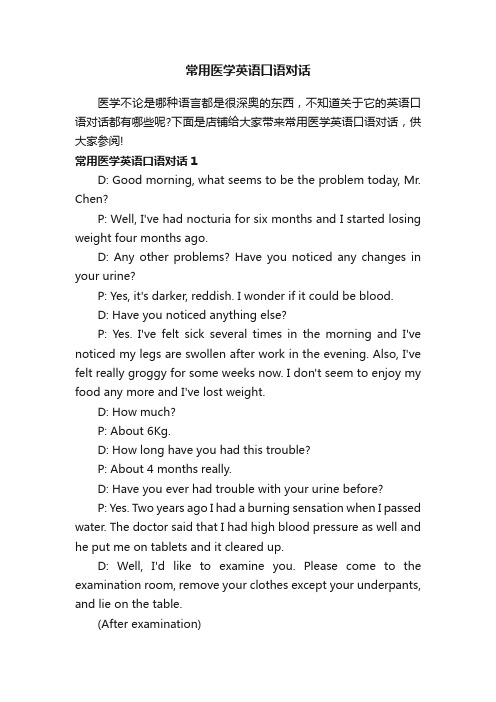
常用医学英语口语对话医学不论是哪种语言都是很深奥的东西,不知道关于它的英语口语对话都有哪些呢?下面是店铺给大家带来常用医学英语口语对话,供大家参阅!常用医学英语口语对话1D: Good morning, what seems to be the problem today, Mr. Chen?P: Well, I've had nocturia for six months and I started losing weight four months ago.D: Any other problems? Have you noticed any changes in your urine?P: Yes, it's darker, reddish. I wonder if it could be blood.D: Have you noticed anything else?P: Yes. I've felt sick several times in the morning and I've noticed my legs are swollen after work in the evening. Also, I've felt really groggy for some weeks now. I don't seem to enjoy my food any more and I've lost weight.D: How much?P: About 6Kg.D: How long have you had this trouble?P: About 4 months really.D: Have you ever had trouble with your urine before?P: Yes. Two years ago I had a burning sensation when I passed water. The doctor said that I had high blood pressure as well and he put me on tablets and it cleared up.D: Well, I'd like to examine you. Please come to the examination room, remove your clothes except your underpants, and lie on the table.(After examination)D: You can get dressed now ... well, it looks like you have some reduced kidney function. I want you to take some blood tests, X-rays and kidney function tests. I'd like you to collect your urine for 24 hours. The nurse will tell you exactly how to do it.Then we'll ask you to come in for an ultrasound examination of the kidneys. This is a very simple procedure to make sure there is no obstruction.P: Can you tell me exactly what is wrong with my kidneys?D: Well, the tests show that you are in a condition called chronic glomerulonephritis, which has damaged the kidneys.P: Is the chronic glomerulonephritis severe? Are there any good treatments to repair the kidney damage?D: Yes, of course. You'd better stay in the hospital for treatments, and observation. We'll have to insert a tube into your abdomen to flash out toxic substances in the blood stream.P: How long will I have to stay in hospital? Will I have to stop working?D: For about 3-4 weeks. Just remind me. What's your job?P: I'm a teacher.D: Well, I should advise you to have a 2-month rest.P: Thank you doctor.D: Not at all.参考译文医生:早上好,陈先生,你哪里不舒服?病人:我夜尿多(遗尿)六个月了,而且我四个月前体重开始下降。
医护英语对话带翻译
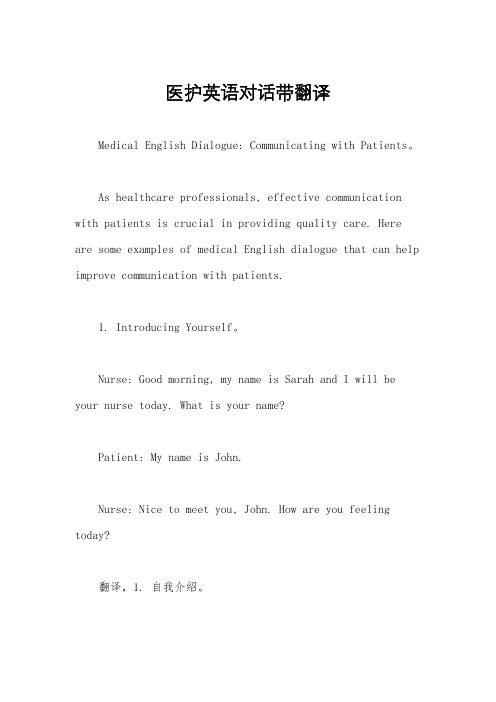
医护英语对话带翻译Medical English Dialogue: Communicating with Patients。
As healthcare professionals, effective communication with patients is crucial in providing quality care. Here are some examples of medical English dialogue that can help improve communication with patients.1. Introducing Yourself。
Nurse: Good morning, my name is Sarah and I will be your nurse today. What is your name?Patient: My name is John.Nurse: Nice to meet you, John. How are you feeling today?翻译,1. 自我介绍。
护士,早上好,我叫Sarah,今天我将是你的护士。
你叫什么名字?病人,我叫John。
护士,很高兴见到你,John。
你今天感觉怎么样?2. Explaining Procedures。
Doctor: We need to take a blood sample to check your cholesterol levels. This involves inserting a needle into your arm. It might be a little uncomfortable, but it should only take a few minutes.Patient: Okay, I understand.翻译,2. 解释程序。
医生,我们需要取一份血样来检查你的胆固醇水平。
医学英语对话
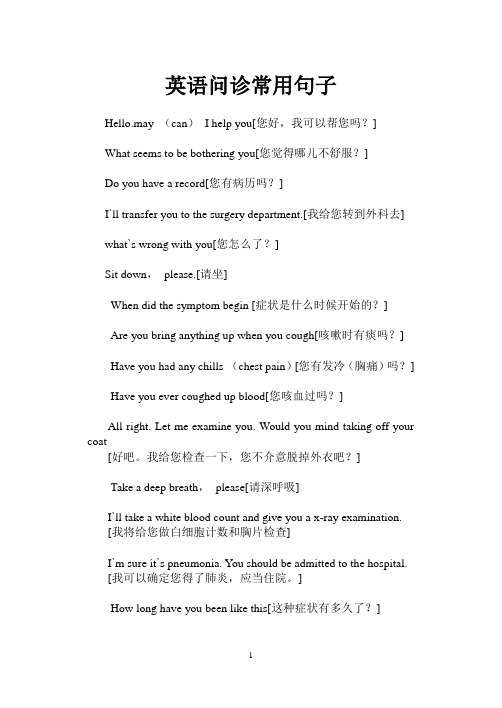
英语问诊常用句子Hello.may (can)I help you[您好,我可以帮您吗?]What seems to be bothering you[您觉得哪儿不舒服?]Do you have a record[您有病历吗?]I`ll transfer you to the surgery department.[我给您转到外科去] what`s wrong with you[您怎么了?]Sit down,please.[请坐]When did the symptom begin [症状是什么时候开始的?]Are you bring anything up when you cough[咳嗽时有痰吗?]Have you had any chills (chest pain)[您有发冷(胸痛)吗?] Have you ever coughed up blood[您咳血过吗?]All right. Let me examine you. Would you mind taking off your coat[好吧。
我给您检查一下,您不介意脱掉外衣吧?]Take a deep breath,please[请深呼吸]I`ll take a white blood count and give you a x-ray examination.[我将给您做白细胞计数和胸片检查]I`m sure it`s pneumonia. You should be admitted to the hospital.[我可以确定您得了肺炎,应当住院。
]How long have you been like this[这种症状有多久了?]When did you begin to notice these symptoms[您什么时候发现这些症状的?]What`s the trouble[怎么啦?]What`s your trouble[你怎么啦?]What`s the trouble with you[你哪儿不舒服]What`s troubling you[你哪儿不舒服]What`s your complaint[你哪儿不舒服]What`s bothering you[你哪儿不舒服]What can I do for you[你哪儿不舒服吗?]What`s up with you[你生什么病了?]What`s the matter with you[你哪儿不舒服?]Is there a sense of distension and numbness[你有胀和麻木的感觉吗?]When did the trouble start[什么时候开始不舒服?]When did the pain start[什么时候开始痛的?]When did it happen[什么时候发生的?]When did your diarrhea start[你什么时候开始腹泻的?]What kind of pain do you feel[你觉得怎么个痛法?]What kind of stool did you notce,watery or mucous[你注意大便的样子了吗?是水样的还是粘液样?]What did you vomit,food or blood[你吐的是什么?食物还是血?]What kind of treatment have you had[你过去用什么方法治疗过?]What about your heart[你的心脏怎么样?]What`s your stool like[大便是什么样子?]Where is your pain[你觉得哪儿痛?]Where does it hurt[哪儿痛?]What`s your appetite[你的胃口怎么样?]How`s your appetite those days[近来食欲怎么样?]How long have you been feeling like this[你有这样感觉多长时间了?]Have you been coughing and sneezing[你是不是一直咳嗽和打喷嚏?]Have you got a high fever[你发烧吗?]Any fever[发烧吗?]Have you got any chronic disease before[你以前有过慢性病吗?]Does it bleed often[常出血吗?]Do you feel short of breath[你觉得气急吗?]Do you feel pain after meals[是饭后痛吗?]Do you feel abdominal pain when you go to the toilet[你去厕所时感到腹痛吗?]Do you have a pain in your stomach[你肚子痛吗?]Do you have a cough[你咳嗽吗?]Do you remember how many times you went to the toilet[你记得去过多少次厕所吗?]Did you receive any treatment before you came to the hospital [来医院前你接受过治疗吗?]I`d like to listen to your chest.[我想听听你的胸部。
英语看病的小对话10句
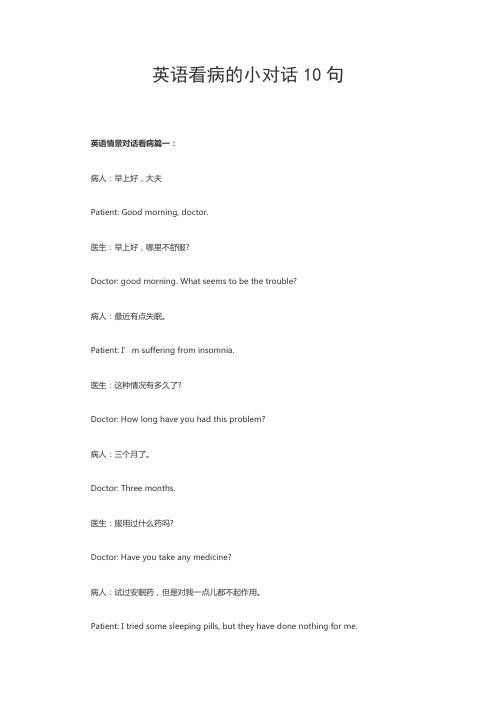
英语看病的小对话10句英语情景对话看病篇一:病人:早上好,大夫Patient: Good morning, doctor.医生:早上好,哪里不舒服?Doctor: good morning. What seems to be the trouble?病人:最近有点失眠。
Patient: I’m suffering from insomnia.医生:这种情况有多久了?Doctor: How long have you had this problem?病人:三个月了。
Doctor: Three months.医生:服用过什么药吗?Doctor: Have you take any medicine?病人:试过安眠药,但是对我一点儿都不起作用。
Patient: I tried some sleeping pills, but they have done nothing for me.医生:有头痛的情况吗?Doctor: Do you have headaches?病人:有时候有。
吃饭也没有胃口,总是感紧不安。
Patient: Sometimes. I have no appetite and always on the edge.医生:让我量量你的血压。
你看来贫血。
Doctor: Let me take your blood pressure. You look anemic. (Taking the patient’s blood pressure.)医生:嗯,没什么好担心的。
你只不过是有点劳累过度。
Doctor: Well, there is nothing to be alarmed about. You are just a little exhausted from overwork.病人:我该怎么呢?Patient: What should I do then?医生:我想你应该多休息休息。
医生患者英语对话精选

医生患者英语对话精选情景对话因为有生动的生活场景和话题,极大地激发了学生练习英语口语的兴趣,为学生提供了练习口语表达的机会。
店铺整理了医生患者英语对话, 欢迎阅读!医生和患者英语对话一A:Hello, Miss.Sit down, please.你好, 小姐。
请坐。
B:Hi, I am feeling terrible.你好, 我感觉糟糕透了。
A:Oh, what's wrong with you?哦, 你怎么了?B:My whole body feels weak, and I have a sore throat.我觉得浑身无力, 而且我喉咙痛。
A:Put this thermometer under your tongue first.What cause the illness?首先把这个温度计放在舌下。
怎么生病了?B:I didn't close the window before going to bed last night.我昨晚睡觉前没关窗户。
A:You do have a fever.I want to take a look at your throat.Open your mouth, please say ah你确实是发烧了。
我想看看你的喉咙。
张嘴说“啊”。
B:Ah.Is it serious?啊。
严重吗?A;Hmm, I think it's nothing serious.Don't worry about it.嗯, 我想没什么严重的。
不用担心。
B:But what should I do to get well?但是我要怎样做才能康复?A:I'll give you an injection first, then I will give you some medicine.我先给你打一针, 然后给你开一些药。
B:When do I take the medicine?我什么时候吃这些药呢?A:Take them after meals twice a day.这些药一天服两次, 饭后服用。
实用医学英语对话大全.doc

At the Registration Office对话3Dialogue Three护士:早上好!Nurse: Good morning.病人:你好!Patient: Good morning.护士:请问哪里不舒服?Nurse: What seems to be the problem?病人:高烧,感觉糟透了。
Patient: I'm running a high fever and feeling terribly bad.护士:这种情况出现有多久了?Nurse: How long have you had the problem?病人:从昨晚开始的。
Patient: Since last night.护士:您以前来过咱们医院吗?Nurse: Well, have you ever been here before?病人:事实上,我也是刚刚到这个城市。
Patient: As a matter of fact, I have just moved to this city.护士:好的,那么您得先填写这张挂号表。
比如您的年龄,挂号,住址等等。
Nurse: O. K. In that case, you have to fill in this registration card. Your age, gender, address and things like that.病人:每问题。
请问我应该挂哪科?Patient: No problem. Which department should I register with, madam?护士:您最好挂内科。
Nurse: You'd better go to the medical department.病人:表填好,给你。
Patient: Here is my registration card.护士:谢谢。
挂号费是一美圆。
Nurse: Thank you. The registration fee is one dollar.,病人:好的。
医疗英语对话
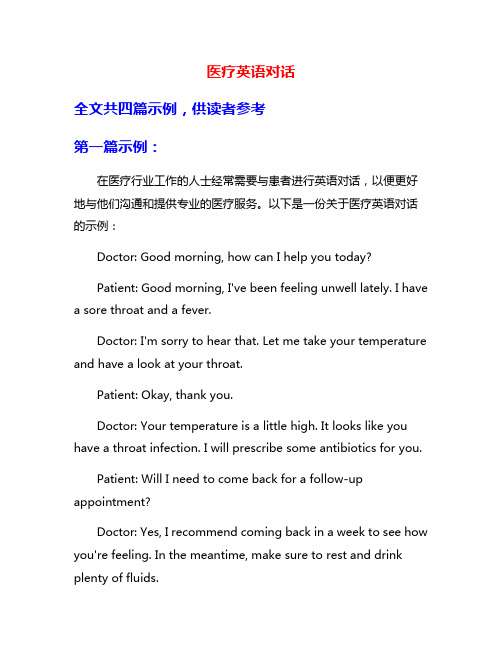
医疗英语对话全文共四篇示例,供读者参考第一篇示例:在医疗行业工作的人士经常需要与患者进行英语对话,以便更好地与他们沟通和提供专业的医疗服务。
以下是一份关于医疗英语对话的示例:Doctor: Good morning, how can I help you today?Patient: Good morning, I've been feeling unwell lately. I have a sore throat and a fever.Doctor: I'm sorry to hear that. Let me take your temperature and have a look at your throat.Patient: Okay, thank you.Doctor: Your temperature is a little high. It looks like you have a throat infection. I will prescribe some antibiotics for you.Patient: Will I need to come back for a follow-up appointment?Doctor: Yes, I recommend coming back in a week to see how you're feeling. In the meantime, make sure to rest and drink plenty of fluids.Patient: Thank you, doctor. I will follow your advice.Doctor: You're welcome. If you have any other concerns, feel free to call the clinic.第二篇示例:医疗英语对话在医疗场所,医生和患者之间的对话至关重要。
常用医学英语口语对话完整版

常用医学英语口语对话 Document serial number【NL89WT-NY98YT-NC8CB-NNUUT-NUT108】P:Goodmorning,doctor.D:Goodmorning,pleasesitdown.WhatseemstobethematterP:IthinkImighthavecaughtacold.D:HowlonghaveyoubeensickP:Fortwodays.D:WhatsymptomsdoyouhaveP:IhavearunnynoseandIacheallover.D:WhatwasthedischargelikeP:Watery.D:IsitthesametodayP:No,itisyellowandthickertoday.D:DoyouhaveafeverP:Ihaven'ttakenmytemperatureyet,butIfeelfeverish.D:Letmetakeyourtemperature.Itwilltake10minutes....Yes,youdohaveafeve r.WereyouexposedtocoldtemperaturesP:Yes,thedaybeforeyesterdaywhenIwenttowork,theweatherwaswarmsoIdidn' twearextraclothes.Intheeveningthetemperaturedroppeddownrapidly.Ont hewayhomeIfeltverycold.AfterarrivinghomeIbegantosneeze.WhenIgotout ofbedthenextmorningmynosewasstuffyandrunning.D:DoyouhaveacoughP:Ijuststartedcoughingtoday.D:DoyouhavephlegmP:Yes,butnotmuch.D:WhatcolorisitP:Paleyellow.D:IsiteasytocoughupP:Notvery.Ihavetouseefforttocoughitup.Thephlegmisalittlesticky.D:HaveyoubeensweatingP:Isweatedalittleaftertakingsomemedicineforfeverlastnight.D:AreyouthirstyP:Yes,Ifeellikedrinkingcoolwater.D:DoyouhaveasorethroatP:Yes,Ido.D:Iwanttolookatyourthroat.Pleaseopenyourmouth.D:DoyoufeelanyotherdiscomfortP:IfeelsoreeverywhereandIfeelverytiredtoo.D:Pleasestickoutyourtongueandletmehavealook.Youhavearedtonguewiththi nandyellowcoating,whichindicateswindandheatinthesuperficialarea.Pl easeputyourhandhereandletmefeelyourpulse....Thepulseissuperficiala ndrapid.P:WhatdoesasuperficialandrapidpulsemeanD:Asuperficialpulsemeanstheattackofpathogenstotheexteriorlayeroftheb odywhichiscalledexteriorsyndromeinTraditionalChinesemedicine,while arapidpulseindicatesheat.P:WhatisthediagnosisofChinesemedicineformeD:Itisacommoncold.Accordingtothesymptoms,themanifestationofthetongue andpulse,youhavegotacommonwind-heattypecold.P:CanyouexplainitmoreindetailD:Pathogenicwindheatoftenattacksthebodythroughthenoseandmouth.Thelun gisinvolvedfirst.Pathogenicwindofyangnatureischaracterizedbyupward andoutwarddispersion.Whenafightgoesonbetweenthepathogenicwindheata ndthebodyresistance,fever,slightaversiontowindandsweatingresult.Wh enthepathogenicwindheatattacksthehead,symptomslikepainanddistendin gsensationoccurinhead.P:That'sinteresting.D:Whenthelungfailstodisperseanddescend,aten-year-oldpatienthasacoughwithyellow,thicksputum.Whenthepathogenicwindhea tstiflestheairpassage,thepatientexperiencingacongestedsorethroatwi ththirst.Thin,whiteoryellowishtonguecoating,andsuperficialrapidpulsearethesignsshowingthelungandthedefensivesystembeingattackedbythepathogenicwindheat.P:Isee.I'dliketobetreatedwithTraditionalChinesemedicine.ThatiswhyIca mehere.WhatkindoftreatmentwillyougivetomeD:IsuggesttheprescriptionYinQiaoSanforyou.Itisatypicalformulafortrea tingwindheattypeofcommoncold.Wemaymodifyitbyaddingsomemoreherbstorelievethesorethroatandtherunnynose.Iwillgiveyoufourdoses.Everydaytakeone.Everydosebringstoaboilanddrainofftheliquid.Addcoldwaterandbringittoaboilthesecondtime.Drinktheliquidfrombothtimes.DoyouunderstandP:Yes,Ido.D:Also,I'llnowgiveyouacupuncturetreatmentonthepointsofthelung,largei ntestineandbladdermeridians,usingthereducingmethod.Thiswillbeveryeffectiveinrelievingyourheadacheandrunnynose.P:WillitbepainfulD:No,justlikeamosquitobite.Afterthatwemayapplycuppingtoyourupperback.(Afterthetreatment)P:Oh,Ifeelmuchbetteraftertheacupuncturetreatment.Myheadachehasgonean dthesorethroathaslessened.Thankyou.D:Afterreturninghomebecarefultorestanddrinkmorehotwater.Thisisyourpr escription.GototheChinesemedicinepharmacyandfillyourprescription.P:Ok.Thankyouverymuch,doctor.D:Youarewelcome.参考译文病人:早上好,医生。
医学英语口语对话

医学英语口语对话1.医学英语口语对话篇一Patient: Can you fill it for me, please?Chemist: Certainly.Patient: Thank you.Chemist:You're welcome. Well, let me see. It will take about five minutes.Patient: All right.Chemist: Ok. This is your herbal medicine.Patient: Could you tell me what I should do with it?Chemist: Every morning soak one bad in 200 mls of cold water for o ne and a half hours, then heat it up quickly. As soon as it begins to boil, turn down the heat, and simmer for thirty minutes. Then turn off the heat. Leave it to cool, then pour out the liquid to drink. Be care ful no to let any of the leaves go into the cup.Patient: It is quite complicated. By the way, can I use a steel pa n?Chemist: No, you can't do that. You'd better use an earthenware po t.Patient: Thank you very much. I have learned a lot today fom you.Chemist: You're welcome. I hope you will recover in no time.2.医学英语口语对话篇二What brings you here?I suffer from a bad headache.Is it worse in the morning or evening?It is severe in the morning.In which part of the head do you feel the pain?The pain is concentrated in the left part.Do you ever feel sick?Yes, it is accompanied by the headache in the morning.Have you noticed any blurring of vision?Yes, sometimes.Do you ever see flashing lights?Yes, I see flashing lights 3 times.3.医学英语口语对话篇三Have you had any fits, faints or funny turns?Yes, I have had fits these days.Was there any warning that you were going to have a fit?Last time I felt dizzy before the fit.Did you bite your tongue?Did you wet yourself?Do you have any problems with your hearing?The hearing is worse than ever.Have you noticed any numbness, tingling, or weakness in your limbs?I have numbness in my limbs, but it is irregular.Do you pass more water than you used to?No, I haven't noticed.4.医学英语口语对话篇四P: Good afternoon! I've come to go through the discharge formalit ies.C: You recovered, congratulations! Would you please show me your discharge certificateP: Here you are.C: This is your bill from the Admission Office. 690 yuan in all.P: And here's all my paper work. How much will I have to pay alto getherC: Just a moment, please, I'll work it out. 890 yuan for hospit alization expenses and 456 yuan for medicine fee. Well, that comes 13 46 yuan altogether.You can either pay in cash or by cards.P:I'll pay in cash. Here’s 1400 yuan.C: Here's your change,54 yuan.P: Can you show me the details of the accountsC: Yes, but you will have to come tomorrow morning.P: My receiptC: I'll give it to you right away.P: Thank you! See you tommorow.C: Bye!5.医学英语口语对话篇五I've come to go through the discharge formalities.You've recovered, congratulations! Would you please show me your discharge certificateThis is your bill from the Admission Office. 690 yuan in all.And here's all my paper work. How much will I have to pay altogeth erJust a moment, please, I'll work it out.890 yuan for hospitalization expenses and 456 yuan for medicine fe e. Well, that comes to 1346 yuan altogether.You can either pay in cash or by cards.Can you show me the details of the accountsYou can go to complete the discharging formalities tomorrow.You hve not settled the accounts yet. You still have a payment of $1000 to make.Return the utensil, please.Is this the place I come to payOh,I'm sorry I don’t have so much money with me.。
常用医学英语口语对话
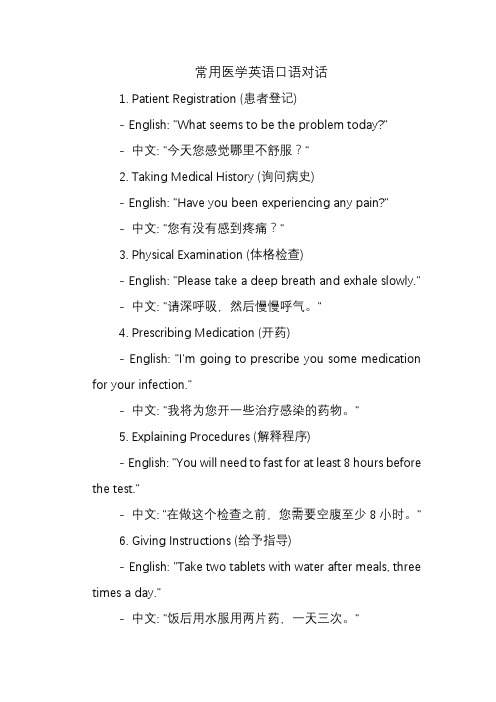
常用医学英语口语对话1. Patient Registration (患者登记)- English: "What seems to be the problem today?"- 中文: "今天您感觉哪里不舒服?"2. Taking Medical History (询问病史)- English: "Have you been experiencing any pain?"- 中文: "您有没有感到疼痛?"3. Physical Examination (体格检查)- English: "Please take a deep breath and exhale slowly."- 中文: "请深呼吸,然后慢慢呼气。
"4. Prescribing Medication (开药)- English: "I'm going to prescribe you some medication for your infection."- 中文: "我将为您开一些治疗感染的药物。
"5. Explaining Procedures (解释程序)- English: "You will need to fast for at least 8 hours before the test."- 中文: "在做这个检查之前,您需要空腹至少8小时。
"6. Giving Instructions (给予指导)- English: "Take two tablets with water after meals, three times a day."- 中文: "饭后用水服用两片药,一天三次。
- 1、下载文档前请自行甄别文档内容的完整性,平台不提供额外的编辑、内容补充、找答案等附加服务。
- 2、"仅部分预览"的文档,不可在线预览部分如存在完整性等问题,可反馈申请退款(可完整预览的文档不适用该条件!)。
- 3、如文档侵犯您的权益,请联系客服反馈,我们会尽快为您处理(人工客服工作时间:9:00-18:30)。
(1) 一般病情:He feels headache, nausea and vomiting. (他觉得头痛、恶心和想吐。
)He is under the weather. (他不舒服,生病了。
)He began to feel unusually tired. (他感到反常的疲倦。
)He feels light-headed. (他觉得头晕。
)She has been shut-in for a few days. (她生病在家几天了。
)Her head is pounding. (她头痛。
)His symptoms include loss of appetite, weight loss, excessive fatigue, fever and chills. (他的症状包括没有食欲、体重减轻、非常疲倦、发烧和发冷。
) He feels exhausted or fatigued most of the time. (他大部份时间都觉得非常疲倦。
)He has been lacking in energy for some time. (他感到虚弱有段时间了。
)He feels drowsy, dizzy and nauseated. (他觉得昏昏欲睡,头晕目眩和想吐。
)He feels as though everything around him is spinning. (他感到周围的东西都在打转。
)He has noticed some loss of hearing. (他发觉听力差些。
)She has some pains and itching around her eyes. (她眼睛四周又痛又痒。
)(2) 伤风感冒:He has been coughing up rusty or greenish-yellow phlegm. (他咳嗽带有绿黄色的痰。
)His eyes feel itchy and he has been sneezing. (他眼睛发痒,而且一直在打喷嚏。
)He has a fever, aching muscles and hacking cough. (hacking = constant) (他有发烧,筋骨酸痛和常常咳嗽。
)He coughed with sputum and feeling of malaise. (malaise = debility) (他咳嗽有浓痰,而且觉得很虚弱。
)He gets a cold with a deep hacking cough. (他伤风咳嗽。
)He has a headache, aching bones and joints. (他头痛,骨头、关节也痛。
)He has a persistent cough. (他不停地在咳。
)He has bouts of uncontrollable coughing. (他一阵阵的咳嗽,难以控制。
)He has hoarse and has lost his voice sometimes. (他声音嘶哑,有时失声。
)He has a sore throat and a stuffy nose. (他嗓子疼痛而且鼻子不通。
)His breathing is harsh and wheezy. (他呼吸时,有气喘似的呼哧呼哧作响。
)He has a stabbing pain that comes on suddenly in one or both temples. (有时突然间太阳穴刺痛。
)He has a runny nose, sneezing or a scratchy throat. (他流鼻水,打喷嚏和喉咙沙哑。
)(3) 女性疾病:She has noticed one lump in her breast. (她发觉乳房有个肿块。
)There is a hard, swollen lump on her right breast. (她右乳房有肿块。
)Her left breast is painful and swollen. (她左乳房疼痛且肿大。
)She has heavy bleeding with her periods. (她月经来的很多。
)Her vaginal discharge is white or greenish-yellow and unpleasant smelling. (她阴道分泌物带白色或绿黄色,而且气味不好。
)She has noticed occasional spotting of blood between periods. (在月经来的前后,她有时也发觉有滴滴达达的流血。
)She has some bleeding after intercourse. (性交后有出血。
)She feels some vaginal itching. (她感到阴部发痒。
)She has painful periods and abnormal vaginal discharge. (她月经来时疼痛,而且阴道有不正常的分泌物。
)(4) 手脚疾病:His both hands and feet ache all over. (他两手两脚都很酸痛。
)He has pain on the sole of his feet. (他脚底很痛。
)There is a wart-like lump on the sole of right foot. (我右脚底有个像肉疣般的硬块。
)His ankles look puffy and they pit when he presses them with his finger. (pit = small dent form;句里的they 和them 都是指ankles)(他的足踝好象肿了,用手按,就有小坑痕。
)The pain in his left foot is accompanied by redness and swelling. (左脚酸痛,并有红肿。
)The joints near his fingernails and knuckles look swollen. (指头和指节旁边的关节,似乎有肿大。
)He has numbness and tingling in his hands and fingers. (他的手和指头感到麻木和刺痛。
)His legs become painful following strenuous exercise. (激烈运动后,他的腿就痛。
)His knee is misshapen or unable to move. (他的膝盖有点畸形,也不能动。
)There are some swellings in his armpit. (他的腋窝肿大。
)He is troubled with painful muscles and joints. (他的筋骨和关节都痛。
)She is troubled by the pains in the back and shoulders. (她的后背和肩膀都痛。
)His knee has been bothering him for some time. (他的膝盖不舒服,已有一段时间了。
)(5) 睡眠不好:He is sleeping poorly.(他睡不好)He has difficulty in sleeping, inability to concentrate.(他不易入睡,也难集中精神。
)It is usually hard for her to fall asleep when she goes to bed at night.(她晚上就寝,很难入睡。
)He wakes during the night or early morning and finds it difficult to fall asleep again.(他晚间或清早醒来后,再也不能入睡。
)He has nightmares occasionally.(他有时做噩梦。
)(6) 男性疾病:He urinates more frequently than usual.(他小便比平时多。
)He has difficulty controlling his bladder.(他很难控制小便。
)(bladder:膀胱)There are some lumps on his testicles. (他的睪丸有些硬块。
)He has had burning or pain when he urinates.(他小便时感到发烫和疼痛。
)He is passing less urine than usual.(他小便比平时少。
)He has had painless swelling in his scrotum.(他的阴囊有不痛的肿大。
)He feels lack of interest in sex.(他自觉对性的兴趣大减。
)He has difficulty starting his urine flow.(他小便不畅通。
)His urine stream is very weak and slow.(他小便流动得很慢很弱。
)He dribbles a little urine after he has finished urinating.(他小便后,还会有少量零星地滴下。
)He has had some discharge from his penis.(他的阴茎排出一些流脓。
)His urine is cloudy and it smells strong.(他的小便混浊,而且气味不好。
)He has a dull heavy ache in the crotch.(他的胯部感到隐痛。
)He has a small leakage of urine when he coughs or sneezes.(他咳嗽或打喷嚏时,会有点泄尿。
)He has trouble urinating.(他小便有困难。
)(7) 呼吸方面:His breathing has become increasingly difficult.(他呼吸越来越困难。
)He has to breathe through his mouth.(他要用口呼吸。
)He is short of breath, even when he has not been exercising, he is breathless.(他喘气;即使不运动,他也是上气不接下气。
